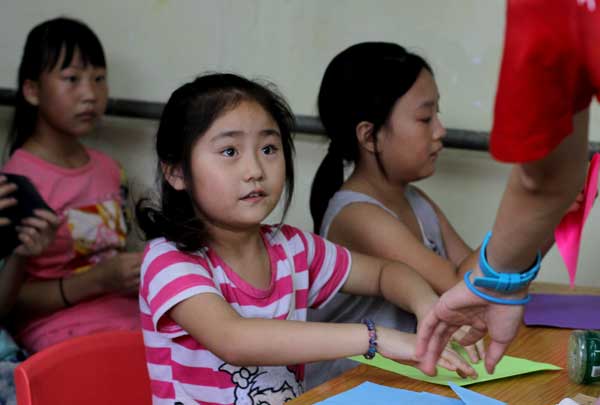 Enjoy your time in Maldives
Enjoy your time in Maldives
 Guangzhou rail service suspended, 80,000 affected
Guangzhou rail service suspended, 80,000 affected
 Top 10 popular destinations in Europe
Top 10 popular destinations in Europe
 Indian-controlled Kashmir celebrates Independence Day
Indian-controlled Kashmir celebrates Independence Day
 Reservoirs in S China start to release floods
Reservoirs in S China start to release floods
 Shining post-90s sports stars
Shining post-90s sports stars
 How do North Koreans stay cool in summer?
How do North Koreans stay cool in summer?
 China Beijing Int'l Gifts, Premium&Houseware Exhibition opens
China Beijing Int'l Gifts, Premium&Houseware Exhibition opens
 Beauty lies in sports
Beauty lies in sports
 |
| Migrant children play paper-folding games at the Mulan Activity Center in the Changping district of Beijing on Aug 7. The center has a library and organizes games.xu huiyan / for China Daily |
Organizations attempt to fill the spare time with daily activities, sports for young visitors
Zhang Xinlin's excitement about spending the summer with his parents in Beijing quickly disappeared when he realized he and his elder sister could not go anywhere, and had to settle for playing cards inside the family's rented apartment every day.
The siblings arrived in Dongshagezhuang, a large community dominated by migrant workers on the outskirts of Beijing, in early July.
"We're not allowed to go out to play because our parents worry about there being bad people on the streets," the 7-year-old said.
Zhang is from a village in Huanggang, Hubei province, and for most of his life has been in the care of his grandfather.
"It's so boring here," said Ni Junhao, 10, who was visiting his electrician father in the community, his third consecutive summer in Beijing. He complained that, despite being in the capital for more than 40 days, he had spent only one with his father, when they went to ride bumper cars in Chaoyang Park. He will return home to his village in Nantong, Jiangsu province, in mid-August.
Nearby, Hu Tian and her sister said their only pastimes are homework and watching their mother play mahjong.
Stories of boredom are common among rural children spending their summer vacations with parents in cities nationwide. One organization that attempts to relieve the boredom for migrant children in Dongshagezhuang is the Mulan Activity Center.
"Most migrant workers rent rooms of 10 to 20 square meters, where they eat and sleep, but children are vivacious and energetic, so it's really painful for them to live in such cramped conditions," founder Qi Lixia said.
Located in a traditional courtyard home, and with room for a maximum of 40 children, Mulan Activity Center is open from 8 am to 8 pm six days a week. Children can read books, play chess and darts, enjoy sports facilities and surf the Internet.
Most facilities are secondhand, donated by charitable foundations or individuals.
"Children can also play badminton in the alley outside," Qi said. "They love playing ping-pong, but we can't afford a table.
"Money has always been our biggest issue as we are not sure whether foundations will continue supporting us next year, and so far we have never received funds from the government for this project," she said.
Sometimes volunteers from universities teach the children handicrafts, environmental protection and personal safety skills in case of fires and earthquakes.
Although demand is huge, Qi estimated that less than 10 NGOs in Beijing provide services like those offered by her organization.
There are no reliable statistics to show how many rural children go to cities during the summer school holiday, which lasts about two months.
A report by the All-China Women's Federation in May said there are almost 100 million minors whose parents are migrant workers. Of these, 61 million are "left-behind children", which means they are growing up in villages without their parents.

 PLA's integrated battle group in live-fire drill
PLA's integrated battle group in live-fire drill Maldives - the best destination for snorkeling
Maldives - the best destination for snorkeling Phubbers turn social etiquette on its head
Phubbers turn social etiquette on its head Jaguar Land Rover to recall 11,852 cars
Jaguar Land Rover to recall 11,852 cars Men's triple jump at IAAF World Athletics Championships
Men's triple jump at IAAF World Athletics Championships Christy Chung on 'COSMO' with lovely daughters
Christy Chung on 'COSMO' with lovely daughtersDay|Week|Month